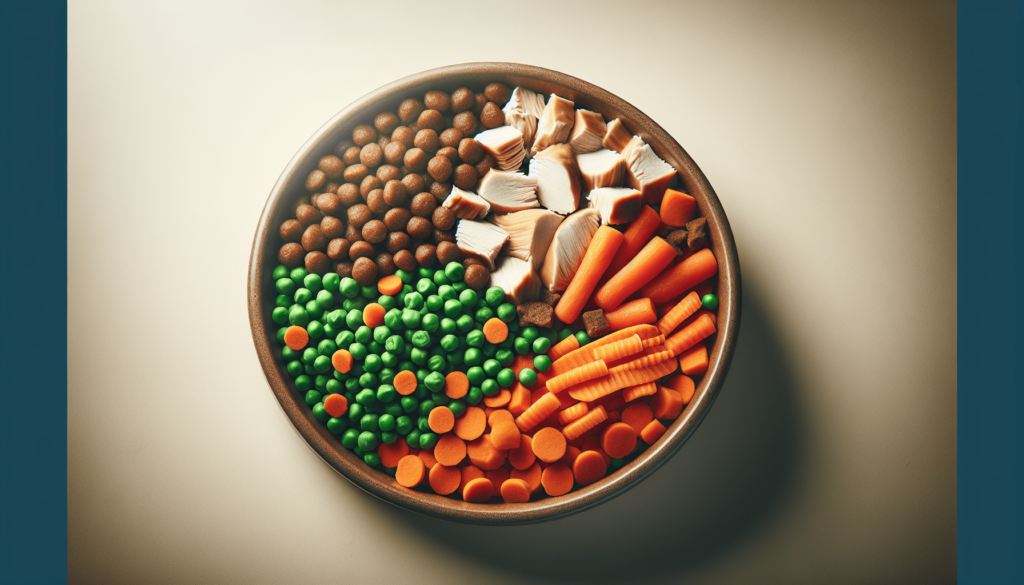Have you ever found yourself standing in the pet food aisle, bewildered by the sheer number of options and mysterious ingredient lists on dog food packages? You’re not alone. I vividly remember the first time I realized just how complex something as seemingly simple as feeding my dog could be.
Choosing the right ingredients in dog food is crucial for maintaining your furry friend’s health and happiness. From ensuring proper nutrition to catering to specific dietary needs, the ingredients you select can make all the difference. In this guide, I’ll walk you through the essentials—what to look for, what to avoid, and how to make an informed decision for your dog’s meals.

Why Ingredients Matter In Dog Food
In our quest for the best nutrition for our dogs, it’s vital to understand why ingredients matter so much. The quality and type of ingredients in dog food can significantly impact your dog’s health, well-being, and longevity. After all, what we feed our dogs fuels their bodies and affects everything from their energy levels to their coat and skin health.
Nutritional Value of Ingredients
Each ingredient contributes distinct nutrients essential for a dog’s growth and maintenance. High-quality ingredients like meat, vegetables, and grains provide proteins, vitamins, and minerals. These help keep your dog’s immune system robust and their organs functioning optimally. Without the right balance of nutrients, your dog might suffer from deficiencies that could lead to health issues over time.
Allergies and Sensitivities
Just like with humans, some dogs can have food sensitivities or allergies to certain ingredients. Ingredients such as wheat, corn, and soy are common offenders, though each dog is different. Knowing the ingredients can help you avoid foods that might trigger allergic reactions in your dog, leading to discomfort or more severe health problems.
What Ingredients Should I Look For In Dog Food?
When choosing dog food, keep an eye out for quality ingredients that lay the foundation for a balanced diet. These core components are essential in ensuring that your dog receives all the necessary nutrients.
Proteins as the Primary Ingredient
One of the main components to look for is high-quality protein. Proteins from animal sources like chicken, beef, lamb, or fish should be among the first on the ingredient list. These provide essential amino acids needed for muscle maintenance and overall health.
Healthy Fats for Energy and Skin Health
Healthy fats, such as omega fatty acids, are also essential for your dog. Ingredients like salmon oil or flaxseed are excellent sources. They contribute to having a shiny coat, reducing inflammation, and supporting cognitive functions.
Whole Grains and Vegetables for Fiber
Whole grains, such as brown rice and barley, and vegetables like carrots or sweet potatoes, provide fiber. Fiber aids digestion and helps maintain a healthy weight. These ingredients also provide carbohydrates, which serve as an energy source for your dog.

Essential Vitamins and Minerals
In addition to the main ingredients, consider the included vitamins and minerals. These micronutrients play a crucial role in bone development, immune function, and metabolism. Fortified dog foods often list additions like calcium, phosphorus, and essential vitamins such as A, D, and E.
Understanding Ingredient Labels
Navigating ingredient labels can be tricky, but it’s important to ensure you’re choosing the best for your dog. Here’s how you can better understand and assess them.
Decoding the Ingredient List
Ingredients are listed by weight, so the first few ingredients are crucial indicators of the food’s primary composition. Look for the percentage of protein, fat, and fiber typically found next to the guaranteed analysis.
Identifying Questionable Additives
Avoid foods with excessive artificial preservatives, colors, and flavors, which can interfere with your dog’s health. Ingredients like BHA, BHT, and ethoxyquin, among others, are not ideal.
Common Myths About Dog Food Ingredients
Let’s tackle some of the common misconceptions you might have encountered about dog food ingredients, ranging from the benefits of grain-free diets to the dangers of by-products.
The Grain-Free Diet Debate
A significant debate in the dog food world involves grain-free diets. While some believe them to be healthier, it’s not suitable for all dogs. Grain-free diets have been linked with certain heart issues, so it’s essential to consult your vet to decide what’s right for your dog.
The Truth About By-Products
Many people avoid dog foods with by-products, but they’re not all bad. Quality by-products, such as organ meats, can be a great source of nutrients. The key is knowing the difference between high-quality and undesirable by-products.
Custom Diets for Special Needs
Does your dog have specific dietary needs? Custom diets cater to various requirements, whether they stem from medical conditions or personal preferences.
Senior Dogs and Puppies
Senior dogs might require lower-calorie foods to prevent weight gain, while puppies need higher protein and calorie content for growth. Special formulations are available for these life stages.
Dogs with Health Conditions
Certain ingredients help with specific health conditions. For example, glucosamine can aid joint health in dogs with arthritis, and limited ingredient diets can help manage food sensitivities.
Tips for Transitioning Dog Food
Switching dog foods is something you might have to do now and then, whether due to a recall, a new dietary need, or simply to try a healthier option.
Gradual Transitioning
Gradually introduce the new food over a week to avoid upsetting your dog’s stomach. Start by mixing a small portion of the new food with the old, gradually increasing the new while decreasing the old.
Monitoring Your Dog’s Reaction
Observe your dog’s reaction to the new food. Check for signs of allergies or digestive issues, such as excessive itching, vomiting, or diarrhea, and consult your vet if these occur.
Frequently Asked Questions
To wrap up, I’ve answered some frequently asked questions about dog food ingredients to help you on your journey.
What Are the Best Dog Food Ingredients for Puppies?
Puppies need a high-protein diet with beneficial fats and certain vitamins and minerals to support rapid growth. Look for food with ingredients such as chicken, fish oil, and sweet potatoes.
Is a Raw Diet Beneficial for Dogs?
Raw diets can offer benefits like shinier coats and higher energy levels, but they also present risks such as nutritional imbalance and bacterial infections. Consult a vet before starting a raw diet.
Should I Avoid Grains in My Dog’s Diet?
Not necessarily. Unless your dog has a grain allergy, whole grains can be a valuable part of a balanced diet. They provide essential nutrients and are often more affordable than grain-free options.
How Can I Tell if My Dog is Allergic to an Ingredient?
Allergic reactions may present as skin irritations, digestive issues, or ear infections. If you suspect an allergy, an elimination diet under the guidance of a vet can help identify the trigger.
Understanding what ingredients to look for in dog food can be transformative for your pet’s health. By prioritizing quality proteins, healthy fats, and crucial vitamins and minerals, you’re setting the stage for a long, healthy, and happy life for your four-legged friend. Feeding your dog with care and attention to their needs will ensure they thrive by your side for years to come.



